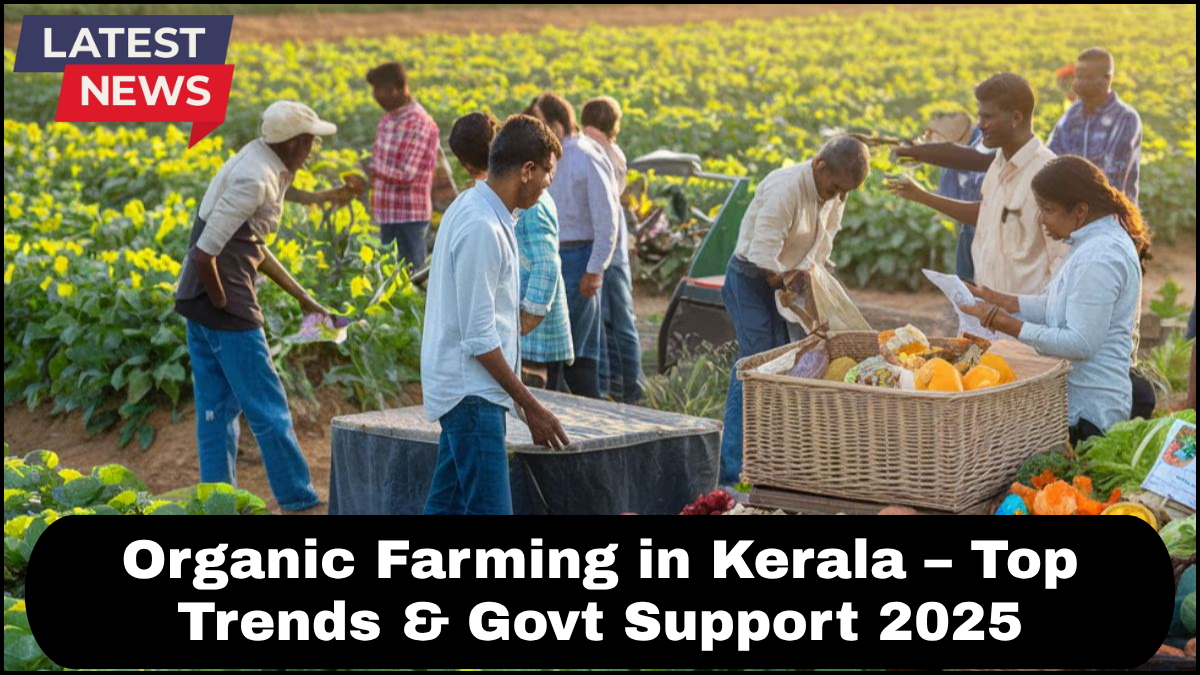Kerala, long known for its lush greenery and eco-conscious outlook, is emerging as a front-runner in the organic farming movement. As Kerala agriculture 2025 continues to pivot towards sustainability and food security, organic practices are no longer a fringe initiative—they’re central to the state’s agricultural roadmap. This shift is being driven by increasing consumer demand, technological innovation, and robust government backing.
In this article, we’ll break down the organic farming trends shaping Kerala in 2025 and examine the various forms of government support fueling this transformation.

Kerala’s Organic Farming Landscape: A Shift in Priorities
Organic farming in Kerala is not just about going chemical-free; it’s a rethinking of the entire agricultural ecosystem. From soil health to market accessibility, everything is being re-engineered to align with sustainability principles.
Farmers across districts such as Wayanad, Idukki, and Palakkad are transitioning to organic methods, spurred by both ecological concerns and higher profit margins. Consumer awareness is at an all-time high, with urban households willing to pay premiums for organically grown produce. This shift is redefining Kerala agriculture in 2025, turning it into a model for other Indian states.
Top Organic Farming Trends in Kerala – 2025
1. Integrated Organic Farming Systems (IOFS)
IOFS is gaining traction as farmers blend crop production with livestock, aquaculture, and vermicomposting. This closed-loop system minimizes external inputs and maximizes resource efficiency. In Kerala, many farmer cooperatives are adopting this model, particularly in tribal and high-range areas, to promote self-sufficiency.
2. Digital Farming Tools for Organic Compliance
The use of agri-tech tools like soil testing kits, AI-based crop monitoring apps, and blockchain for traceability is on the rise. Organic farmers in Kerala are now using QR codes and digital platforms to certify and market their produce, which builds consumer trust and streamlines certification.
3. Community-Based Organic Clusters
2025 has seen an increase in the formation of farmer producer organizations (FPOs) focused solely on organic cultivation. These clusters not only make inputs more affordable but also create a collective marketing strategy, boosting farmer incomes.
4. Agri-Tourism Rooted in Organic Farming
Kerala’s tourism sector is intertwining with agriculture through organic farm stays and eco-tourism experiences. Tourists can visit spice plantations and organic vegetable gardens, participate in farming activities, and even attend organic cooking classes. This trend has turned organic farming into a viable source of secondary income.
5. Rise in Organic Paddy and Traditional Crop Cultivation
Farmers are returning to native rice varieties and heirloom seeds that are naturally pest-resistant and require fewer external inputs. Vechoor rice, Njavara, and Pokkali are seeing a revival, aligning with both environmental goals and market trends.
Government Support for Organic Farming in Kerala
The Kerala government, in alignment with national policies, has launched multiple programs to boost organic agriculture in the state. Here’s how:
Subsidies and Financial Assistance
-
The State Organic Farming Policy provides up to 50% subsidies on organic inputs like bio-fertilizers and neem-based pesticides.
-
Financial support is extended to convert conventional farms into certified organic units, with grants for certification costs and training.
Training and Capacity Building
-
The Kerala Agriculture University (KAU) conducts regular workshops and field training programs on organic farming best practices.
-
Schemes like Paramparagat Krishi Vikas Yojana (PKVY) and Rashtriya Krishi Vikas Yojana (RKVY) are being tailored to Kerala’s topography and climate, offering district-level implementation.
Marketing and Export Facilitation
-
The government has facilitated the creation of organic bazaars and e-commerce platforms exclusively for certified organic products.
-
Export support, including logistics and documentation for global organic markets, is being offered through the Kerala State Agricultural Marketing Federation.
Organic Certification Made Simple
-
The Participatory Guarantee System (PGS), a low-cost alternative for small farmers, is being promoted for community-based certification.
-
Real-time certification tracking through mobile apps is reducing red tape and encouraging farmer participation.
Challenges That Remain
Despite the progress, challenges such as initial conversion costs, lack of awareness in some rural belts, and market volatility persist. However, with continued policy backing and innovation, Kerala is well on its way to becoming India’s organic farming capital.
FAQs on Organic Farming Trends in Kerala 2025
Q1: Why is organic farming gaining momentum in Kerala?
Because of growing environmental concerns, consumer demand for chemical-free food, and strong government incentives.
Q2: What crops are commonly grown organically in Kerala?
Spices like pepper and cardamom, traditional rice varieties, coconut, vegetables, and fruits are among the most popular.
Q3: Are there any government certifications for organic produce in Kerala?
Yes, farmers can get certified through PGS or third-party certifications under the National Programme for Organic Production (NPOP).
Q4: How can small farmers transition to organic methods?
Through government-funded training programs, subsidies on inputs, and support from local FPOs and cooperatives.
Q5: Is organic farming profitable in Kerala?
Yes, especially when combined with value addition and direct-to-consumer models. Farmers report higher margins and steady demand.
click here to learn more
